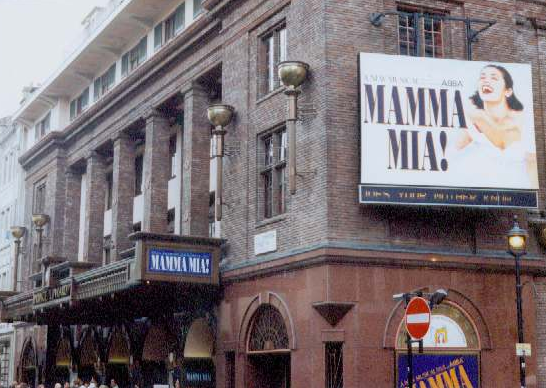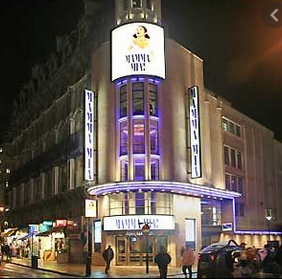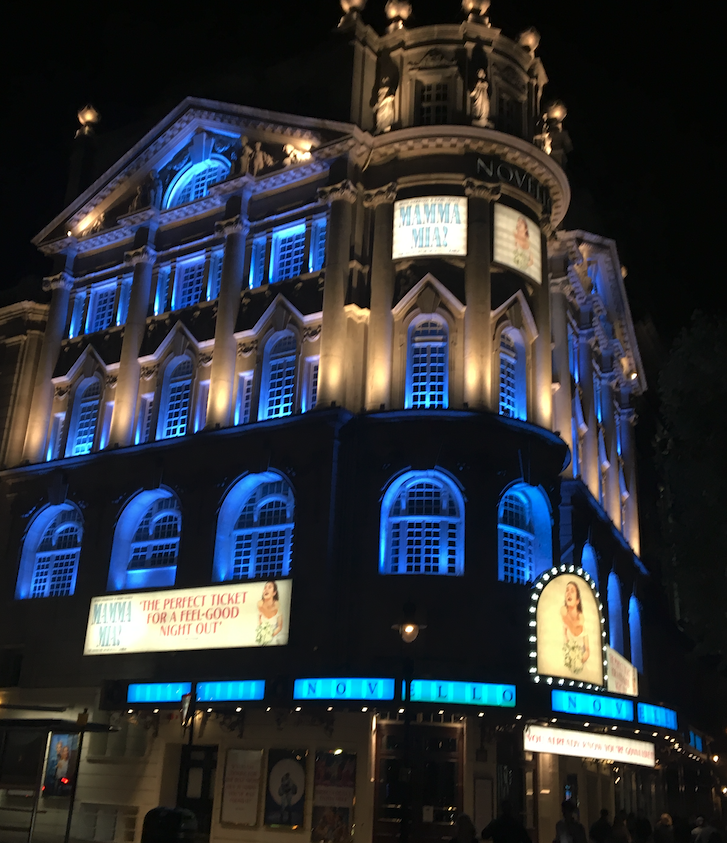Earlier this week Mamma Mia! marked its 22nd anniversary in the West End (it premiered at the Prince Edward Theatre on April 6, 1999, subsequently moving twice — first to the Prince of Wales, and then its current home, the Novello). Of course, for the last year — like every other big musical there — it has been missing in action, and the company laid off.
But this summer it is set to be revived for an open air season of 23 performances only at Harewood House, near Leeds, running from August 13-30.
Seeing it al fresco will introduce a new novelty to this wonderful production; though interestingly, when I was on the Greek island of Skiathos — where much of the location shooting for the film version took place — a couple of years ago, I actually watched the film version under the starlit sky, within the walls of a one time covered cinema that had somehow fallen into disrepair and no longer had a roof!


But I’ve seen the show more times than I care to count, from the opening to its 10th anniversary performance in London and its subsequent moves to each of the other theatres it has played in here in the West End. I’ve also seen it multiple times on Broadway, including the first invited ‘gypsy run through’ in September 2001, just weeks after 9/11 when it was the first new musical to open and it provided New York with a much needed tonic.
It’s difficult to believe now, but in the wake of that seismic event Broadway was only shut down for two days, before its reopening became a symbolic sign of the city’s determination to get back to normal, despite the still smouldering ruins at the tip of Manhattan had crushed its sense of its invincible self.
Broadway, of course, has now been shut down for over a year — the longest shutdown in history — thanks to the pandemic, and though there a handful of events took place last weekend to edge the city towards a theatrical return of sorts, the key event at the St James Theatre was a one-off show for only 150 spectators that featured two short solo appearances by actor Nathan Lane and dancer Savion Glover.
This is a very long way from the nightly crush of theatregoers that usually team along 44th Street, visiting theatres like the Majestic (across the street, usually home to Broadway’s longest running show, The Phantom of the Opera), the Broadhurst (where Mamma Mia! transferred to after leaving its original home the Winter Garden) and the Shubert (Broadway’s signature musical house, that was long-term home to A Chorus Line and most recently housed Hello, Dolly!, before being occupied now by a play, To Kill a Mockingbird, which is due in London next year).
As Mamma Mia! marked its 22nd birthday in silence this week, though, I’m reminded of its incredible influence on musical theatre during the early noughties, launching a whole genre of imitation jukebox show franchises based on plenty of other iconic pop groups and music back catalogues.
As I tweeted on Tuesday evening,
It was, of course, producer Judy Craymer — pictured with the Abba boys Benny Andersson and Bjorn Ulvaeus above — who created this phenomenon (and also produced both of the hugely profitable films that followed); but she was also the producer of the woebegotten Viva Forever!, crafted around the back catalogue of The Spice Girls in 2012, so even she couldn’t make lightning strike twice.
I’ll never forget the first night, where I was seated just three rows behind David Beckham and his wife Victoria, the original Scary Spice in the line-up, so at least I had something pretty to look at when I wanted to avert my gaze from the stage (which was sadly frequently).
A few months after that opening, I ran into Craymer at another West End first night, and she came up to me and told me how she wanted to cut my balls off. After reading my review, she’d cried, she told me.
I explained that I was only doing my job — I have to call it like I see it, however uncomfortable. And she replied, “But I thought we were friends!”
And though I didn’t think of the right response at the time, alas, it came to me the next day: “Yes, and friends tell each other the truth.”
I’d strongly championed Mamma Mia! from the time I first saw it — and re-reviewed it regularly in the years that followed, as much for pleasure as to catch up on landmark events.
In 2004, when it moved to the Prince of Wales, I wrote this for WhatsOnStage:
“Mamma Mia! Here we go again!
My, my, how can we resist it?
Oh, since the day it started,
we’ve been so broken hearted:
no, no, nothing’s quite as good in townNever mind that none of the pop musicals that have inevitably followed Mamma Mia! into the West End have come nowhere near to matching its effortless ease and exhilarating high spirits. This is a musical with heart and, unlike such cynical imitators as We Will Rock You and Tonight’s the Night, there’s real art and craft, too.
But the good news of Mamma Mia! has just got even better. Re-opening the dazzlingly refurbished Prince of Wales (after a refit that’s cost over £7m), the theatre is a show in itself, even if some of the finer details weren’t quite finished by press night yet….
But more importantly, the show, too, has been sparklingly recreated in its spanking new environment. Now, in a theatrical configuration and comfort that recalls its Broadway home, the likewise lavishly refurbished Winter Garden Theatre (but with better legroom here), the show remains as fresh and exhilarating as it was when it first opened at the Prince Edward Theatre five years ago.
In 2012, when it moved again to the Novello, I wrote this for The Stage :
:
“You already know you’re gonna love it!” proclaims the brilliant advertising slogan, summing up in just seven words both the enduring appeal of Mamma Mia! and its ongoing success. It has reportedly been seen by over 42 million people and grossed over $2 billion dollars worldwide since first opening in the West End 13 years ago, sweeping the world from Australia to Antwerp and Sao Paulo to Shanghai, while the film version has become the most successful screen musical of all time.
And in the game of musical chairs that West End shows sometimes weirdly play, Mamma Mia! has just moved to its third London home, giving Mark Thompson’s original designs a fresh, but dare I say it, cheaper look. The previously gleaming proscenium surround that extended into the auditorium has been ditched and a new natural wood-coloured one recessed into the existing prosc instead. And the boardwalk that elevates Sophie and Sky for their final upstage walk has gone, too.
But those are arguably mere cosmetic details. At its heart it remains an irresistible show, full of punchily and hilariously choreographed production numbers (courtesy Anthony van Laast), that is full of heart. Best of all is the infectious enthusiasm of a cast who know what pleasure this show gives, and know that as conduits to it they must commit 100% to the task.”
The show also broke new ground in its portrayal of female empowerment and agency, and the fact that it was the work of an all-female team in the principal roles of producer, director (Phyllida Lloyd) and writer (Catherine Johnson).
As I wrote in a feature for the souvenir brochure,
“Though it was accident rather than design, Craymer notes, “I am delighted that Mamma Mia!’s success was the result of an unprecedented collaboration of three women, but there was no discrimination of men intended.” And in fact, the onstage relationships of the three best friends – Donna and the Dynamos – at the centre of the piece mirrors that of the women who between them created the show: Craymer has indeed commented, “We all see ourselves as those three women on the stage, because Catherine is the slightly chaotic single mom, I’m the high-maintenance mum, and the pragmatic one is Phyllida.”
The secret of the show’s success, however, is that it’s not just its creators who see themselves onstage, but the audiences do, too. Phyllida Lloyd notes, “In Catherine Johnson’s ingenious story, the audience seemed to be having a very particular experience. They were seeing themselves on stage.” In the process, the songs are re-born and the show’s themes – of lost parents, a search for identity, and the generation gap – have a universal resonance. As Johnson says, “There’s a mother-daughter relationship; an old romance; there’s losing someone and finding him again. There are all kinds of things that everyone can relate to.” This is a show about real people in real situations, yet a wonderful pop score that provided the soundtrack for a generation in the 70s and early 80s anchors it now as the soundtrack for a show whose appeal crosses all age and national boundaries.
And my feature concluded by quoting musical supervisor and arranger Martin Koch, who said that Mamma Mia! is “the show Bjorn and Benny never knew they had written. Their music has made pop history; our show has made musical theatre history.”
I can’t wait to welcome it back to the West End later this year.
